The Feudal Society in Medieval Europe
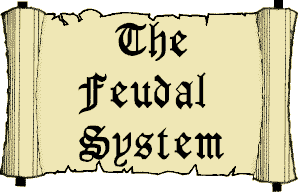
image source
Although the word ‘feudal’ was not used to describe a system of traditional obligations in medieval Europe until much later, in the 17th century, the structure was heavily developed in England - starting around the time of its conquest - by William the Conqueror. William almost immediately began erecting permanent defenses, like castles, around the countryside, and needed about 5000 people to man these forts. Nobles were offered incentives – the important commodity of land – instead of money. They in turn agreed to supply armed knights and anything else the king needed. But land grants had already started to come into play during the Carolingian territory expansion of the 8th century - as the heavy cavalry was developed so did the necessity to fund the upkeep of this expensive military service including horses, equipment and retinue. As shown in the Bayeux Tapestry the Normans used heavily armoured mounted cavalry to great advantage against the English, who had the costly disadvantage of being on foot. Raids by the Vikings and the Magyars through Europe had also helped show the need for supporters to be rewarded in return for their much-needed aid.
image source
The Bayeux Tapestry is a great source of information regarding feudalism, among other things. It shows Harold pledging his vassalage to William, agreeing to keep the succession of the English kingdom clear for William once the reigning King Edward had died. Harold then reneged on this promise, with the severe consequence being that William invaded England and Harold lost his life (the ultimate result of breaking his oath of allegiance) - the major events and outcome of the Battle of Hastings is told clearly in the Tapestry.
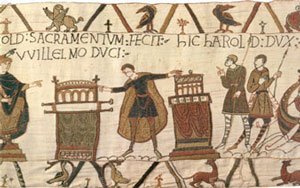
Harold pledging fealty to the conquering William
image source
Basically the feudal system was a pyramid of commitment – at the top was a king or emperor then aristocracy (including church leaders), then petty nobles & bureaucrats and lastly the peasants; although the system was fairly rigid it was open to much wheeling & dealing. Charters, indentures, contracts and sub-contracts, exceptions and exemptions flowed up and down the chain of command – only those at the very top and the very bottom were virtually unaffected – the kings because they held all the power, and the peasants because they held none. It was used as an excuse for invading other countries for more territory – in 1059 the pope ‘encouraged’ the Normans into attacking Sicily, by giving them feudal rights over territory which wasn’t even theirs. The Church also let William know God was on his side if he invaded England.
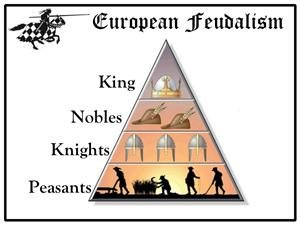
image source
The epic poem, The Song of Roland, contains an interesting example of the feudal system, as while in Spain warring against the Saracens, the Frankish Emperor Charlemagne extracts a pledge of allegiance by King Marsile – with the King promising to be Charlemagne’s vassal in exchange for Charlemagne withdrawing from his country. The King then reneges on this pledge so Charlemagne calls on some of his loyal vassals to return and enforce his position. Roland is one who volunteers to return as he honours his pledge of obedience and service. There is also an Archbishop in the party - men of the Church often being called into allegiance in similar fashion to the knights. Roland is set up in a trap and eventually calls on his horn as a signal for help to call back Charlemagne, knowing that his leader will return to protect him – this being part of the understanding between parties during a pledge of commitment.
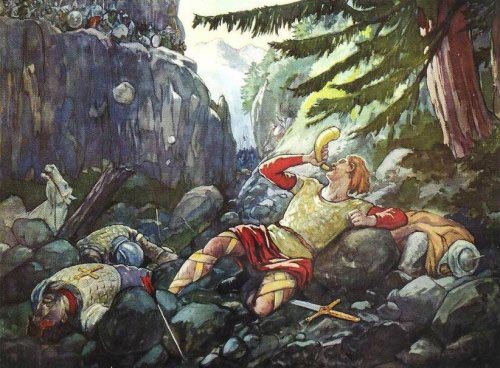
one depiction of Roland calling for Charlemagne, using the horn
image source
Just as the use of feudalism was not contained within just a few countries, but widespread throughout Western Europe, it was also not confined to secular groups. The Church was caught up in the system, as it had to perform feudal duties to receive the protection of the King. Becoming a vassal weakened the Church’s authority as a central control unit, becoming pawns in political dealings locally as nobles vied for control.
We are given other examples of the system of feudalism via the courtly love poet. The love lyric has shown the similarity between the singer's own feelings of allegiance, obedience and submission to their heart’s desire, and that of a vassal to his lord. They also wrote lyrics which reflected acts of chivalry, such as in the poem “Sir Gawain and the Green Knight”. The (often chaste) lover was supposed to show devotion to a lady he could not love openly, and yet was expected to look at no other. His reward was little, and his danger could be great – if the husband found out it could mean loss of lands, or bodily harm or to the besotted lyricist. Similarly, a vassal was expected to show true allegiance to his lord regardless of his treatment, and severe consequences for betrayal.
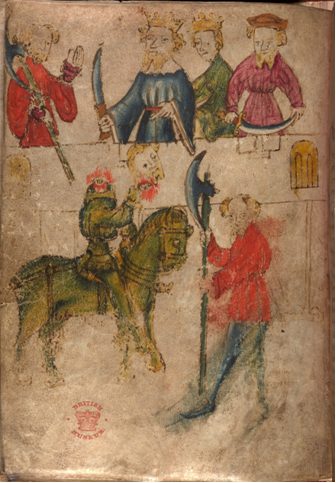
from the original manuscript, author unknown
image source
The structures of feudalism have left us with ideals of trust and codes of honour, the emphasis of land-holding as a base of power, our attitude toward, and use of, contractual obligations and ruling of law. It has been the catalyst for our contemporary structures of society such as governmental rule (with the vassals being district councils, local city councils and so on down the chain), even if we are not directly governed by a sovereignty any longer. Although we may no longer recognise the source of how we do things, we have a lot to owe to the feudal developers of medieval times.
This essay was one I wrote as an assignment, while obtaining my University degree. I have included the bibliography - reference materials I used while writing - just as I’d had to for its submission. It has never before been published anywhere public, though. Images have been added for visual interest.
Bibliography:
Norman Davies, Europe A History, London: Pimlico, 1997
George Holmes [Ed.], The Oxford Illustrated History of Medieval Europe, Oxford: Oxford University Press, 1988
Nigel Saul [Ed.], The Oxford Illustrated History of Medieval England, Oxford: Oxford University Press, 1997
Nigel Saul, A Companion to Medieval England 1066 – 1485, Gloucestershire: Tempus Publishing Ltd., 2005
Dr John Stevenson [Gen Ed.], The History of Europe, London: Mitchell Beazley, 2002
Roy Strong, The Story of Britain, London: Oman Productions Ltd., 1996
David M. Wilson, The Bayeux Tapestry, London: Thames and Hudson Ltd., 1985
Retrieved, 29 March 2009, from:
http://www.middle-ages.org.uk/feudal-system.htm
Retrieved, 20 March 2009, from:
http://www.middle-ages.org.uk/villein.htm
Retrieved, 29 March 2009, from:
http://en.wikipedia.org/wiki/Feudalism
Retrieved, 29 March 2009, from:
http://en.wikipedia.org/wiki/Vassal
Retrieved, 29 March 2009, from:
http://en.wikipedia.org/wiki/Serfdom
Retrieved, 31 March 2009, from:
http://www.historyworld.net/wrldhis/PlainTextHistories.asp?historyid=ac35
Retrieved, 6 April 2009, from:
http://en.wikipedia.org/wiki/Paladins
Retrieved, 6 April 2009, from:
http://en.wikipedia.org/wiki/The_Song_of_Roland
This was a joy to read, thank you. I've been recently researching medieval Europe and this was such a fun piece of writing to find.
Oh, thank you very much for enjoying it!
What topic is your research on, if you don't mind me asking?
Arthurian mythos, the Saints in the Western esoteric tradition and Jung's archetypes and where all of them intersect.
Oh, very cool! Seems like quite a wide catchment to pull your research from.
Will you be writing a piece on your results?
I hope so, now that I've kind of found the others on here - I would like to refocus my blog surrounding my work.
So, yes, I would like to.
You received a 10.0% upvote since you are not yet a member of geopolis.
To read more about us and what we do, click here.
https://steemit.com/geopolis/@geopolis/geopolis-the-community-for-global-sciences-update-2-higher-base-votes-new-logo
If you do not want us to upvote and comment on your posts concerning earth and earth sciences, please reply stop to this comment and we will no longer bother you with our love ❤️
Oh cool!!
Thank you for this, it is lovely to connect with fellow history-buffs. :)
This is great! Informative and high quality and it has nothing to do with cryptocurrency. This is exactly the sort of content Steemit needs to turn into a solid social media platform. Thank you so much for sharing it!
Great point about cryptocurrency, 90% of posts on steemit are chart analysis or hype/fud.
lol @ 'nothing to do with cryptocurrency' - I hadn't considered that.
It makes me very happy when people enjoy reading my essays, I really appreciate it. :)
YES to the above. Nothing to do with Crypto :-)
Very nice! I love me some medieval history and Feudalism shaped medieval history. I once saw a pyramid similar to the one in your post but it included the church as well. One cannot underestimate the influence of the church in these times. I mean wars were fought between the Holy Roman Emperors and the Popes over who should control the church. Also the different kinds of Feudalism in Europe alone could be an entire post on its own.
Oh, absolutely ... and definitely ... and there would be some really interesting stuff to research. :)
As usual, really great read. This gave me a reminder of some Domesday Book reading that I did, when looking at Nemeton, or Newcastle-under-Lyme, originally a woman's teaching place a nd birthing sanctuary. Anyway, I came across the richest man in the history of all England. As far as I could make out, this man, a bastardy son of a King, became a land owner unparalleled by Kings anywhere in Europe. His treasure became so great GE may very well have bought the Kingship for those Kings he was said to Kingmaker of. If you get an opportunity, look into the life and times of John O'Gaunt. I'd be very interested in another unbiased view. 😇
I shall try. :) I have read a bit about him already, especially for genealogical purposes.
Very interesting about Newton, I'd like to chase that one up too! :)
Nemeton. My ph decides sometimes to go its own way. I go on, and edit later. But, in Literature, an author, Mary Stewart, wrote a trilogy that ended in quadrology. About Merlin, as opposed to Arthur, in the legend between Roman, Celtic and Saxon, Pritain, Logres or 'Anglaland'. The place of Nemeton, or the 'Women's Hall' is the village underground at Newcastle-under-Lyme, in the limestone 'womb' of the hill, by the Trent on borders of Mercia, Wrekin, in Sherwood of prehistory, nowadays the border of North Staffordshire near Stoke-upon-Trent. I have found several references, but no actual study.
In the sixties, I was lucky enough to also descend into Grimes Graves, before safety and Heritage had them closed, so I've always wanted to pot-hole into the cave village beneath Newcastle-under-Lyme. I remember essay writing as a schoolboy at RHS, and the ability to go to many city's archives and libraries, which is so hard to do by nano-tech from bush QLD.
I love Mary Stewart books! I've tried to find & collect all in that series before I start reading them. <3
We had the good old Encyclopedia Britannica reference tomes to pore through. Good times.
You may also be interested in reading some Juliet Marillier then. I'd recommend The Bridei Chronicles. Historical fantasy, interwoven with legends & facts.
http://www.julietmarillier.com/books/
I am not sure but I believe fifth book, a prequel, has also now been published. It has been many years since I read these. But they out doall others telling of the Arthurian legend.
Thank-you, I don't believe I've come across J. Marillier. I will look her up, maybe comment later after a read. I actually go hard-copy library, but thanks for www site.
The website was just to reference her books so you could get a feel for them. I hope your library has a copy of the series. :)
Today I managed to find a copy of Mary Stewart's The Wicked Day - score! :D
Hello @ravenruis and I realize this is an old post, but after my comments and your replies here, I was talking with someone else about author's, and I remembered a connection. You don't have to of course, but I do recommend a book by Georgette Heyer of fame writing comedies of Regency England. Her very last book, unfinished by her passing was collated and finished by her husband and her publisher. It is not Regency nor comedy (well some, but I've a weird sense) but an historical called My Lord John. The most trusted brother of Henry V. From Richard II, it gives an internal view into the intricacies of being a part of House Lancaster. (1393 - 1435)
Highly recommend. A very good read. I have picked it up three or four times over the years since 1975 publication, and always find new stuff to research.
ISBN: 978-0-7531-8042-6 (hb)
ISBN: 978-0-7531-8043-3 (pb)
--There is a wonderful glossary in the back, with amazing words for colours in pageantry.
The Lancaster tree looks easy to read, but like any family, and more so when wrapped in power and influence, the complications within it are drama, tragedy and comedy all wrapped up and sieved through liking and 'honour.' 😇
Thank you, I will follow up on the book and see if my library stocks it. :)
I've delved into the Lancaster tree (and others) for genealogy research - some of it would make your eyes cross lol, but that's the aristocracy for you. :D
Yep, some younger than 12 don't die of first born, then have six or seven more and marry again because when married at eleven the husband might have been fifty.
Thanks for this! I enjoy history a tad older, but I think thats just because usually when I read about medieval kings and stuff it sounds really boring and feudalism pisses me off.
You totally made this digestible, informative and enjoyable so thank you! Keep up awesome content like this please!
Oh, thank you very much for enjoying it!
I definitely don't like to read dry facts myself. I should dig into some juicy stuff then, lol. :)
Interesting that the first title in your bibliography is by Norman Davies: I remember meeting him twenty-five years ago (we went to the same school)...
Oh, wow. That is so cool. :)
Resteemed your article. This article was resteemed because you are part of the New Steemians project. You can learn more about it here: https://steemit.com/introduceyourself/@gaman/new-steemians-project-launch
Thank you so much! :)
It was definitely interesting to learn how feudalism impacted our society today in regards to the value of holding land! My dad is a history teacher, so I basically spent my childhood learning about just about everything, but this is a topic I never came across so thank you!
Looking forward to your future posts :)
As part of my genealogy research I tended to stick to the UK, so while there can be some cross-over in how things worked there is also a lot of variety in European history too.
There's never enough time to learn everything lol, but picking micro-areas (can that be a real thing?) of interest and delving into them is probably more effective than a sweeping overview.
I really appreciate that you found the essay interesting. :)
Popping over to say hi :-)
agree with the above, we NEED more non Crypto and HISTORY well now... that is just perfect!!!!!!!
I love history.
Have a fab day
waves thank you for visiting here! I really appreciate it.
You might like to check out the Geopolis Discord group, which I've recently joined after they left a comment in this post. A keen group that has added history to its repertoire :)